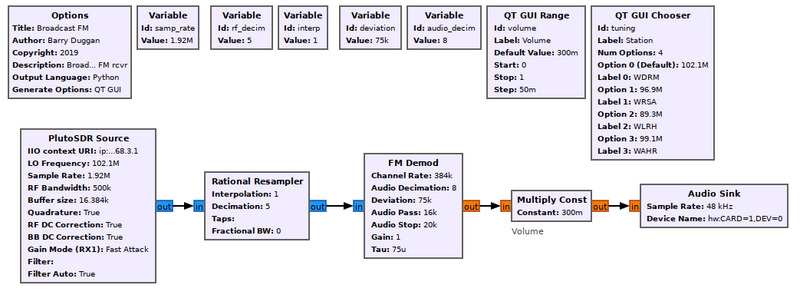FM Demod: Difference between revisions
Jump to navigation
Jump to search
No edit summary |
(correct parameter descriptions) |
||
| (One intermediate revision by the same user not shown) | |||
| Line 7: | Line 7: | ||
; Audio Decimation | ; Audio Decimation | ||
: | : Input to output decimation rate (integer) | ||
; Deviation | ; Deviation | ||
: | : Maximum FM deviation (default = 5000) (float) | ||
; Audio Pass | ; Audio Pass | ||
| Line 26: | Line 26: | ||
== Example Flowgraph == | == Example Flowgraph == | ||
Implementing an FM broadcast band receiver is really easy. | |||
[[File:Pluto_FM_fg.png|800px]] | |||
== Source Files == | == Source Files == | ||
Revision as of 16:51, 20 August 2020
Generalized FM demodulation block with deemphasis and audio filtering. This block demodulates a band-limited, complex down-converted FM channel into the the original baseband signal, optionally applying deemphasis. Low pass filtering is done on the resultant signal. It produces an output float stream in the range of [-1.0, +1.0].
Parameters
- Channel Rate
- Incoming sample rate of the FM baseband (integer)
- Audio Decimation
- Input to output decimation rate (integer)
- Deviation
- Maximum FM deviation (default = 5000) (float)
- Audio Pass
- Audio low pass filter passband frequency (float)
- Audio Stop
- Audio low pass filter stop frequency (float)
- Gain
- Gain applied to audio output (default = 1.0) (float)
- Tau
- Deemphasis time constant (default = 75e-6), specify tau=0.0 to prevent deemphasis (float)
Example Flowgraph
Implementing an FM broadcast band receiver is really easy.
Source Files
- C++ files
- TODO
- Header files
- TODO
- Public header files
- TODO
- Block definition
- TODO
